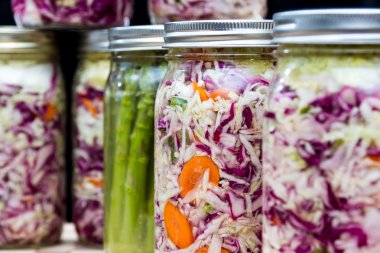Probiotics & Prebiotics: What They Are?, How Do They Work?, and When To Take Them?
In recent years, the health and wellness community has been abuzz with talk about probiotics and prebiotics. These two components play vital roles in maintaining a healthy gut, which in turn supports overall well-being. But what exactly are probiotics and prebiotics? How do they work? And when should you incorporate them into your diet?
Let’s dive deep into understanding these crucial elements of gut health.
What Are Probiotics?

Probiotics are live microorganisms, often referred to as “good” or “friendly” bacteria, that provide health benefits when consumed in adequate amounts.
These beneficial bacteria primarily reside in your gut, where they help maintain a balanced microbial environment.
Common Sources of Probiotics:
- Fermented Foods: Yogurt, kefir, sauerkraut, kimchi, miso, tempeh, and pickles.
- Supplements: Available in various forms, including capsules, tablets, and powders.
Benefits of Probiotics:
- Digestive Health: Probiotics can help balance the gut microbiome, reducing symptoms of digestive issues like bloating, constipation, and diarrhea.
- Immune Support: A healthy gut contributes to a robust immune system by preventing the growth of harmful bacteria.
- Mental Health: Emerging research suggests a link between gut health and mental well-being, often referred to as the gut-brain axis. Probiotics may help reduce symptoms of anxiety and depression.
What Are Prebiotics?
Prebiotics are non-digestible fibers that serve as food for probiotics. Unlike probiotics, prebiotics are not live organisms. Instead, they are specialized plant fibers that feed the good bacteria already present in your gut, helping them grow and thrive.
Common Sources of Prebiotics:
- Fiber-Rich Foods: Bananas, onions, garlic, leeks, asparagus, artichokes, and whole grains.
- Supplements: Available as powders, capsules, and incorporated into various health foods.
Benefits of Prebiotics:

- Gut Health: By feeding the beneficial bacteria, prebiotics help maintain a healthy balance in the gut microbiome.
- Digestive Support: Prebiotics can improve bowel regularity and enhance overall digestive health.
- Enhanced Nutrient Absorption: A healthy gut microbiome can improve the absorption of essential nutrients, such as calcium and magnesium.
How Do Probiotics and Prebiotics Work?
Probiotics and prebiotics work together to maintain a healthy gut microbiome. Think of probiotics as the seeds you plant in your garden and prebiotics as the fertilizer that helps those seeds grow.
When you consume probiotics, you introduce beneficial bacteria into your gut. These bacteria help outcompete harmful microorganisms, reducing the risk of infections and supporting overall gut health. However, for probiotics to thrive, they need nourishment. This is where prebiotics come in.
Prebiotics provide the essential nutrients that probiotics need to grow and multiply, ensuring a balanced and diverse gut microbiome.
The Relationship Between Probiotics and Prebiotics

The relationship between probiotics and prebiotics is symbiotic. Probiotics require prebiotics to survive and function effectively, while prebiotics are ineffective without the presence of beneficial bacteria to consume them.
This synergy is crucial for maintaining gut health and, by extension, overall well-being.
When Should You Take Probiotics and Prebiotics?
Probiotics:
- After Antibiotics: Antibiotics can disrupt the balance of good and bad bacteria in your gut. Taking probiotics can help restore this balance.
- During Digestive Distress: If you experience symptoms like bloating, gas, or diarrhea, probiotics might help alleviate these issues.
- Daily Maintenance: For general health, incorporating probiotics into your daily routine can support a healthy gut microbiome.
Prebiotics:
- With Probiotics: To maximize the benefits of probiotics, take prebiotics simultaneously. This ensures that the probiotics have the necessary nutrients to thrive.
- Daily Intake: Prebiotics can be consumed daily through a fiber-rich diet or supplements to support ongoing gut health.
How Often Should You Take Them?
The frequency of taking probiotics and prebiotics can vary based on individual health needs and goals.
Probiotics:
- Daily: For general maintenance, a daily dose is typically recommended.
- As Needed: In response to specific conditions, such as after a course of antibiotics or during periods of digestive distress.
Prebiotics:
- Daily: Consuming prebiotic-rich foods or supplements daily ensures a steady supply of nourishment for your gut bacteria.
Wrapping Up

Understanding the roles of probiotics and prebiotics in maintaining gut health is essential for overall wellness.
By incorporating both into your diet, you can support a balanced and thriving gut microbiome, leading to improved digestion, enhanced immune function, and even better mental health. Whether through food or supplements, ensuring you get enough of both probiotics and prebiotics can be a game-changer for your health.
So, consider adding these powerful allies to your daily routine and experience the benefits of a healthy gut.













More Stories
5 Health Benefits of Garcinia Cambogia
Unlock the Power of Your Morning Brew
Fatigue or Tingling – Check Your B-12